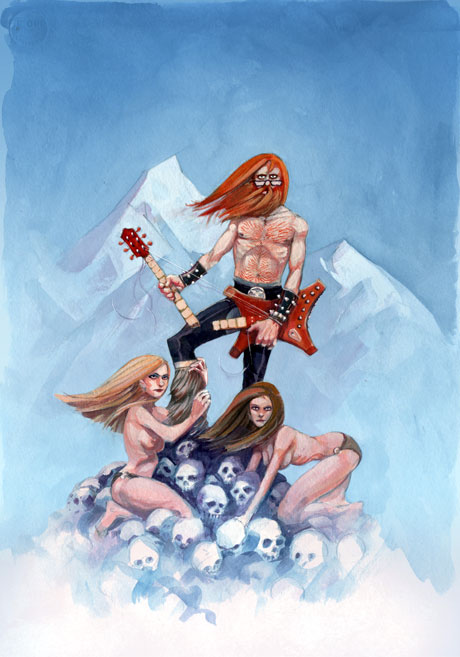When my name finally rang out, I realized why my preparation had been so casual: I wouldn’t be the one performing.
Windhammer
Rockin’ the Philadelphia Air Guitar Championship

Backstage, an hour before show time, the cramped green room buzzed and shuffled with conversation and preparation. Rhinestones and tassels adorned leather and denim, which adorned bodies aged eighteen to forty-eight, travelers hailing from as far as West Virginia. Many were veterans of the air guitar stage, and some had competed as recently as the previous night. Having failed to capture the titles in their home towns of New York, Boston, and Washington DC, they were trying for a second, third, or fourth time in Philadelphia.
I had no such experience. Just a few days before, I didn’t even have plans to compete, and less than a year before that, I was unaware that anyone even had the option to make such plans. My eyes were opened, as so many others were, by the documentary film Air Guitar Nation. It chronicles the 2003 search for an air guitarist to represent the United States for the first time at the World Air Guitar Championships in Oulu, Finland. The contestants’ pursuit of that dream is predictably comical, and watching their frenzied undulations around a much-maligned imaginary instrument had caused me to respond in a way I’m sure is quite common: “These guys are so lame.” But my superiority came from a different place than most. It was pride speaking, to be sure, but my pride judged not the behavior itself, but the quality of the behavior. “I could do this so much better.”
Months later, as my seasoned opponents discussed the carefully-calculated strategies behind their forthcoming performances, my boastful statement seemed naïve. I’d decided on my stage name, song selection, and costume in an instant, and I’d rehearsed twice. Others in the green room sounded like they’d recruited focus groups.
“I did Metallica in DC, but Philly’s more of a blue collar town, so I’m going with some Priest tonight.”
“I saw a whole bunch of Poison memorabilia at the Hard Rock Cafe today, and I’m wondering if that was some kind of sign.”
“That guy who did ‘Higher Ground’ the other night should have been disqualified – he was playing air bass for half the song!”
The rules – there are more than you’d think – explicitly state that the air guitar is the only instrument that may be played during a performance in the competition. The judges, who are usually local musicians or radio personalities treated to a generous dose of social lubricant, are rarely as pedantic about the rules as the more serious contestants. Scores are based on three judging criteria: technical merit, stage presence, and “airness,” which is described as, “the extent to which the performance transcends the imitation of a real guitar and becomes an art form in and of itself.”
As the house lights went down, the audience made its desire to experience that art form known. The emcee took the stage and began warming up the crowd while my competitors and I waited in the wings. I double-checked my costume. Jeans? Check. Combat boots? Check. Black leather chaps? Check. Fuzzy, blue athletic wristbands? Check. Bare chest? Check. All that was left to do was to wait for my stage name to be called. When it finally rang out, I suddenly realized why my preparation for this night had been so casual: I wouldn’t be the one performing.
Windhammer took over without a word, pouring himself into me, beginning with my heart and lungs and spreading outward. As each cell was possessed, it shared its newfound immortality with its neighbors until none were left to convert. My Irish pallor gave way to an unearthly glow.
My body was stolidly walked onto the stage by its new occupant. To say he was confident would falsely suggest that failure was even a possibility. His stare pierced every eyeball in the house, and those who managed to avoid it directly were startled to attention when it bounced off the rear wall and stabbed into their retinas through the cranium-coated pulp behind them. He was a being of such pure will that outside forces could not possibly have brought about his existence. He had created himself, and whatever emotion his makeup allowed was dutifully focused on his sole purpose: to rock.
Windhammer assumed the power stance, spreading his feet apart and bending his knees slightly to achieve an impenetrable center of gravity. Some of his competitors preceded their performances with the ceremonious presentation and last-minute tuning of their phantom instrument, often with the assistance of an unworthy roadie. Windhammer had no need for such theatrics. He didn’t intend to pantomime the movements of a guitar player backed by a prerecorded song. He would generate the song himself, pulling it from the air and hurling it mercilessly at his audience.
There was a breathless pause, and it began. Amidst seven forceful windmill strums, Windhammer stood his ground, traveling down the scale and back up, accompanied by a high-pitched wail and sustaining the final chord for a few seconds over a thunderous drum fill. The scale repeated, the wail’s pitch increased, and the drums cascaded into the audience through a sweeping, pointed finger. The vocals slackened a bit on the third go-round, temporarily taming the maelstrom, only to erupt into an ear-splitting scream on the fourth and final bar of the intro.
Windhammer’s left hand was a blur. His right hand dashed up and down the invisible fretboard, furiously articulating chords in unprecedented contortions. If anyone witnessing the light-speed riff even had a chance to wonder what the hurry was, the abrupt emergence of the solo answered their question. It announced its presence with a shrill battle cry, a single, piercing note clearing the way for an eager battalion of its siblings. With ferociously wide eyes, Windhammer orchestrated the invasion effortlessly. Each attacking note was brought into being not just by his hands, but by his whole body. The air guitar swayed and lunged with his body, and his body swayed and lunged with the music. The three were one.
When it was over, both the audience and the judges loudly signified their boisterous approval. Some of the subsequent contestants managed to trump Windhammer’s score, but he still qualified for the next round and was ultimately named the victor.
There wasn’t much time to bask in the glory. The venue was double-booked, and we were rushed out to make way for the hundreds of Roots fans lined up around the block. But Windhammer wasn’t about the limelight, anyway. He had already vanished, giving me back my body as quickly and silently as he had taken it, perhaps responding to a plea for a mind-melting rock explosion in some other dimension.
All I could do was smile. For years, I have clung to a buoyant, youthful admiration of a rock and roll that has as much to do with stagecraft, mythology, and libido as it does with composition, dexterity, and tenacity. The latter ingredients had eluded me, but the former had found an audience, likely made up of people who, like me, sometimes enjoy music best in the company of their bedroom mirror.
I changed out of my costume on the sidewalk as I watched the venue change hands. Most of Philadelphia’s citizens were unaware they had a new hero, and that his mortal vessel would be riding his bike home.
![]()
Rob Weychert is a graphic designer in Philadelphia and a geek for chess because he gets his kicks above the waistline, sunshine. robweychert.com
Kevin Cornell is a short, bitter man in Philadelphia and is a geek for finding fault with the youth of today because he is confused by technology. bearskinrug.co.uk
